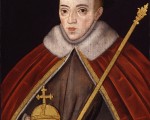
On this day in history events for 2 – 8 November.
[Read More...]
Today marks the anniversary of the death of Edmund Tudor, 1st Earl of Richmond, on 1st November 1456. He died from the plague at Carmarthen Castle.
Thank you to Sarah Bryson for writing this article on Edmund for us.
Henry Tudor, King Henry VII, was the founder of the Tudor Dynasty. His mother was the imposing Margaret Beaufort who risked everything to see her son on the throne and in turn the houses of Lancaster and York united through the marriage of her son to Elizabeth of York, daughter of Edward IV. But who was Henry Tudor’s father? While so much is known about Henry’s mother, his father is a much more elusive figure and sadly he did not live to see his only son and heir claim the English throne.
[Read More...]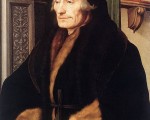
Erasmus: his name is synonymous with humanism, education and intelligence. Across Northern Europe several Erasmus programs exist at universities, so students may pursue their studies at multiple universities and in multiple languages. During his lifetime, Erasmus corresponded with such notable people as Sir Thomas More and John Colet. Erasmus assisted Hans Holbein in his quest to move to England, and advised Anne of Cleves’s father when he was writing religious tolerance laws.
Desiderius Erasmus was born on 27 or 28 October 1466 or 1467* in Rotterdam, Netherlands. His exact date of birth is not known. The second son and an illegitimate child of his father, a priest, and mother, a physician’s daughter, Erasmus was sent to school at the age of five. In about 1484, when Erasmus was approximately eighteen years of age, his parents both died of plague. Erasmus’s three guardians sent Erasmus and his brother to a new, more conservative school run by the Brethren of the Common Life. There, Erasmus studied Latin and Christian theology.
[Read More...]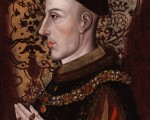
As you may have read in this month’s Tudor Life magazine, 25th October marked the feast day of Saints Crispin and Crispinian, and following the victory of England over France on 25 October 1415 at the Battle of Agincourt, the day became a celebration of that event too. Celebrations included bonfires, revelry and the crowning of a King Crispin.
Today, Heather Darsie shares an article with us on the Battle of Agincourt back in 1415.
[Read More...]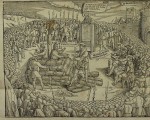
he burnings of two of the Oxford martyrs: Hugh Latimer, Bishop of Worcester, and Nicholas Ridley, Bishop of London took place on this day in 1555, in the reign of the Catholic Mary I. The two men, along with Thomas Cranmer, who was burnt at the stake on the 21st March 1556, are known as the Oxford Martyrs and their lives and deaths are commemorated in Oxford by Martyrs’ Memorial, a stone monument just outside Balliol College and near to the execution site, which was completed in 1843. A cross of stones set into the road in Broad Street marks the site of their burnings.
[Read More...]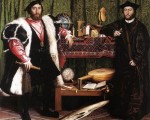
Thank you to our resident art expert Melanie Taylor for letting me know about this radio programme which aired today on the BBC Radio 4 programme “In our Time”.
Blurb: Melvyn Bragg and guests discuss the life and work of Hans Holbein the Younger (1497-1543) during his two extended stays in England, when he worked at the Tudor Court and became the King’s painter.
[Read More...]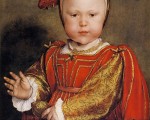
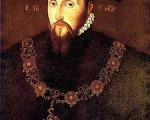
On this day in history, 11th October 1549, Edward Seymour, the Duke of Somerset, Lord Protector of the Realm and Governor of the King’s Person, was arrested and brought in front of Edward VI who summarised his charges as “ambition, vainglory, entering into rash wars in mine youth, negligent looking on Newhaven, enriching himself of my treasure, following his own opinion, and doing all by his own authority, etc.”
[Read More...]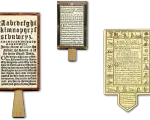
In today’s Claire Chats, I talk about how children were taught to read in the medieval and Tudor periods.
[Read More...]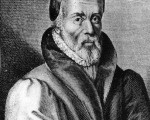
As today is the anniversary of the execution of reformer, scholar and Bible translator, William Tyndale, Sarah Bryson has written an article on this fascinating man.
William Tyndale was born in Gloucestershire in 1494 to parents who worked in the cloth trade. Tyndale was born into a Catholic dominated England under the rule of Henry VII. He was brought up a strict and devout Catholic being taught the importance of mass and good works which would help him gain access to heaven. He would have participated in regular confession and penance and his daily life would have been dominated by Saints’ days and following the Catholic faith. The Bible that Tyndale would have known growing up would have been written in Latin, the holy language. Meanwhile the common people would have spoken English, a rough language which was not considered suitable for the holiness of the Church.
[Read More...]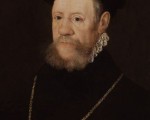
On 29th September 1553, Michaelmas or the Feast of St. Michael and All Angels, Mary I created fifteen1 Knights of the Bath as part of her coronation celebrations.
[Read More...]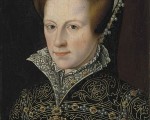
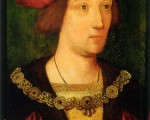
Elizabeth of York, daughter of Edward IV, got pregnant straight after her marriage to Henry VII in January 1486 and the news of her pregnancy was celebrated throughout England. Henry VII, was ecstatic at the news and decided that the birth of his first-born would take place at Winchester, the place believed to have been the capital of the legendary Camelot and the site of King Arthur’s castle, and that the child would be called Arthur. Henry was convinced that Arthur’s birth would bring about a new golden age.
[Read More...]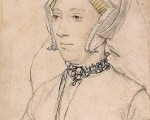
Born on the 22nd March 1519, Katherine Willoughby was the daughter of William, 11th Baron Willoughby, and his wife Maria De Salinis, one of Queen Katherine of Aragon’s ladies. When Katherine was just seven years old. her father died and with no male son surviving Katherine was his heir. In March 1528 Charles Brandon bought the wardship of Katherine from the King for a staggering £2,266 13s 4d with the intention of marrying Katherine to his son Henry. Katherine then came to live with the Brandons to be raised.
Charles Brandon’s third wife, Mary Tudor, Queen of France, died between seven and eight o’clock in the morning on the 25th June 1533. Her funeral was held on the 20th July 1533 at Bury St Edmunds. Katherine attended the funeral and she and her mother brought forward palls of cloth of gold to the altar.
[Read More...]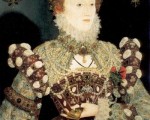
Gloriana, Elizabeth I, is the famous Virgin Queen of England. She never took a husband. Much speculation has swirled around Elizabeth’s decision to remain single. Several tragic, if not traumatic, events are cited as reasons why Elizabeth chose not to marry.
Elizabeth was born on 7 September 1533. On 19 May 1536, when Elizabeth was not quite three years of age, her mother, Anne Boleyn, was beheaded by order of her father. Elizabeth, a precocious child, asked following the fall of her mother, “how haps it governor, yesterday my Lady Princess, today but my Lady Elizabeth?”. Elizabeth’s first step-mother, Jane Seymour, died of puerperal fever in 1537 only days after giving birth to Elizabeth’s little half-brother. Elizabeth was four years old. Katherine Howard, a cousin of Elizabeth’s on her mother’s side and Elizabeth’s third step-mother, was beheaded for high treason for her “dissolute life previous to her marriage” in February 1542. Elizabeth was eight years old.
[Read More...]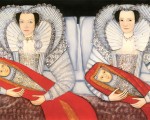
Childbirth is openly discussed in today’s society. Images of pregnant women appear in magazines and women giving birth can be seen on television and in movies. Yet during the medieval period, childbirth was deemed a private affair. Giving birth in the middle ages was a dangerous time for women and childbirth did not discriminate. Young mothers, older mothers, poor or rich mothers, all could die not only in childbirth but also due to complications afterwards. Sadly, more than one in three women died during their child-bearing years.
[Read More...]
Historian Gareth Russell is the editor of our monthly Tudor Life magazine and he’s been working hard on scheduling expert articles and also expert talks for the next few months. We are thrilled to bits that so many historians and authors want to be involved in the Tudor Society by offering their knowledge and expertise to our members – a big thank you to them and to all our members too for your continued support.
Contributors to Tudor Life magazine in the coming months include:
[Read More...]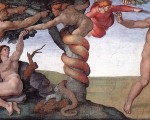
While in today’s modern times many people are more open with their knowledge and acceptance of sexual intercourse, during the Tudor period things were very different.
The church played a major role in sex and the duties of the female body. The Virgin Mary and Eve, the mother of mankind, helped to develop people’s views of sexual intercourse, birth and the formation and function of the female body. Messages were conveyed not only through sermons but also through images and paintings. The act of intercourse, was tainted by the fall of Eve. Women were seen as inferior versions of men and were thought to be greatly susceptible to the devil and the dark forces. The Church taught that women’s bodies ran hot and thus they always desired sex and acts of fornication. Thus marriage and sex within marriage was the only way to control a woman’s desires. Sex was strictly confined to marriage and only for the purpose of reproduction.
[Read More...]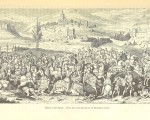
On 16th August 1513, a battle which became known as “the Battle of Spurs” or the Battle of Guinegate, took place at Guinegate (Enguinegatte) in France. It was a battle between the English, backed by Imperial troops, and the French and is called “the Battle of the Spurs” because the French knights, taken by surprise and realising that they were outnumbered and outmanoeuvred, fled on horseback, their spurs glinting in the sunlight.
[Read More...]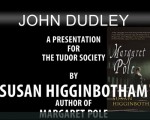
In our second expert video of the month, we have Susan Higginbotham. Susan discusses John Dudley and analyses whether all that was said about him is true.
[Read More...]